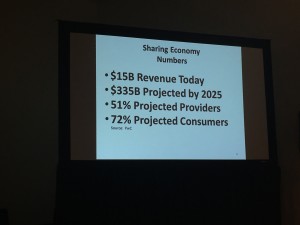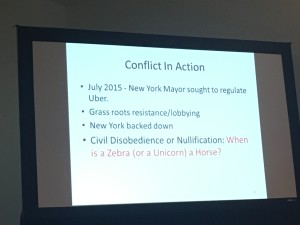Gerard Stegmaier discussed consumer protection, labor and employment law, privacy and data security, antitrust and competition policy, and industry-specific licensure in relation to big data, the sharing economy and the Internet of things. First and foremost he shared with us a quote from Mark Zuckerberg “Run fast and break stuff.”
To start off what is the sharing economy? Well its where individuals can borrow or rent assets owned by someone else which creates a scenario that we do not need to own things in order to use them. The sharing economy is also seen as a hybrid model peer to peer based sharing of access of goods and services through community based online services ( relationship of parties is fundamentally different). According to the PWC, 43% of Americans participate in sharing.
People want to be able to share and participating in it makes them feel good. There are home owner communities now that share the gardening tools with the neighborhood. This sharing economy allows others to not have to purchase each individual tool they might need but still use the tool when needed. This peer to peer based sharing is just one example of the many that are around the world we live in.
“Justice is personal and sharing is caring,” Stegmaier said.
Gerard starts off with a story, the story of Zak Stone a tech writer and reporter. He had traveled many times and he was trying to tell parents about the neat opportunities of Airbnb. His father was opposed to it however later decided it was such a great idea, leading Zak and his parents to stay in an Austin home through Airbnb. Zaks dad got on the swing that was hung on a tree branch. The tree branch broke and hit his father on the head killing him. Zak had shared this information about sharing economy with his father leading to such devastating news. Going back to the quote mentioned above about justice, who was responsible for what happened? Was it the company the individual for knowing Airbnb does not have insurance for users? There are risks on both sides you have to allocate.
 The sharing economy is projected to be $335B by 2025 which means an explosion of demand and growth of opportunities and challenges for lawyers. There are cultural difference between silicon valley but challenge MVP, minimum viable products, is required. A test pilot of the technology products is vital when wanting to see if it will work or not with the public. Zaks dad probably didn’t think he was going to be test pilot for the swing. Who is going to be responsible?
The sharing economy is projected to be $335B by 2025 which means an explosion of demand and growth of opportunities and challenges for lawyers. There are cultural difference between silicon valley but challenge MVP, minimum viable products, is required. A test pilot of the technology products is vital when wanting to see if it will work or not with the public. Zaks dad probably didn’t think he was going to be test pilot for the swing. Who is going to be responsible?
For example, Why do we like Uber? We make decisions to use Uber get in and go to meeting you are late to even if you do not want to. Conflict with cabs and other ride services is heavily regulated as a cab company.
 How can people use these services comfortably and not feel like they will be ripped off. People want to see Airbnb and Uber as trustworthy.
How can people use these services comfortably and not feel like they will be ripped off. People want to see Airbnb and Uber as trustworthy.
These are some practical considerations for lawyers:
- Risk management
- Agreement design and drafting
- Entity structure
- Legalities and taxation of exchange
- Securities regulation
- Employment regulation
- Regulation of production ad commerce
- Relationships with a and use of land
- Intellectual property
- User generated content, everything that is involved when you are doing peer to peer to exchange, if we are going to collaborate who is going to keep the song for example.
I believe that the sharing economy offers many great things, with Uber and Airbnb. However, there are many unanswered questions that come up when incidents happen.
